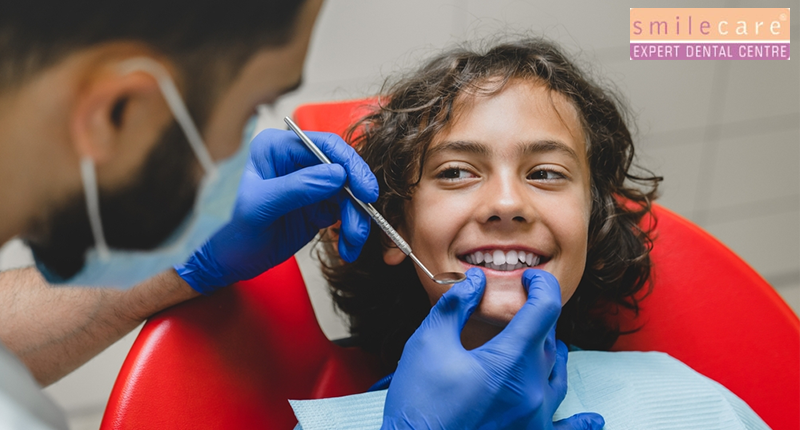A child’s smile is a treasure, a glimpse of innocence and joy that warms our hearts. Yet, behind that radiant smile lies a story of tiny teeth and budding emotions. Dental health for children is not just about teeth and gums; it’s about nurturing their well-being and preserving the essence of their infectious laughter.
Independent studies state that one in every five children between the ages of 5 and 11 years has an untreated cavity. Children’s dental health is a critical aspect of their overall well-being. Poor oral hygiene can lead to pain, discomfort, and long-term health issues.
As a parent or guardian, understanding the common dental issues that affect kids and how to prevent them is essential for ensuring your child’s oral health.
In this article, we will discuss ten common dental problems that children face and provide valuable tips on preventing them.
10 Common Dental Problems in Children
- Tooth Decay
Also known as cavities, it is the most prevalent dental problem in children. It happens when bacteria present in the mouth produce acids that erode the tooth enamel.
To prevent tooth decay, children should brush their teeth twice a day, floss daily, and limit sugary snacks and drinks. Also, it is recommended to visit the dentist for dental check-ups.
- Gum Disease
Gum disease, such as gingivitis, can affect children as well. It results from the inflammation of the gums due to plaque buildup.
Educate the child to brush gums gently, and encourage regular dental check-ups for professional cleanings and guidance on proper oral care.
- Teeth Grinding
Teeth grinding, or bruxism, is common in kids and often occurs during sleep. While it can be a natural development phase, it’s essential to monitor the situation and consult a dentist if necessary.
Parents must watch their children at night to protect teeth from grinding-related damage. Also, they must educate their children about the consequences of such problems.
- Thumb-Sucking
Prolonged thumb-sucking habits lead to dental problems, including misaligned teeth. At the same time, such habits affect the overall structure of the dentition.
Encourage your child to stop these habits gradually, and consult a dentist for advice on corrective measures if needed.
- Malocclusion
Malocclusion refers to misaligned teeth or an improper bite. It can lead to speech difficulties and dental problems. Some children may also suffer from gum diseases and jaw joint problems.
Early orthodontic assessments can identify and correct malocclusions before they become severe. Doctors recommend X-rays and impressions of the teeth to diagnose malocclusion.
- Dental Injuries
A dental injury is one of the most common dental problems in children. They are often active and may experience dental injuries while playing sports or in accidents.
Cricket, skating, football, basketball, and boxing are some of the sports where dentition is likely to get injured. Use protective gear like mouthguards when appropriate, and educate your child about dental safety.
- Tooth Sensitivity
Tooth sensitivity can cause discomfort when consuming hot or cold foods and beverages. Having sensitive teeth could mean giving up on certain foods, mood swings, swelling, or irritation among children.
Use toothpaste designed for sensitive teeth, and consult a dentist if the issue persists. The dentist can assist you in treating tooth sensitivity & help the children overcome such problems.
- Enamel Hypoplasia
It is a condition where the enamel doesn’t develop properly, making teeth vulnerable to decay. When a child’s enamel is too thin, their teeth become far more susceptible to decay.
Following good oral hygiene is crucial for identifying and addressing this issue. If ignored, it can affect both baby teeth and permanent teeth.
- Baby Bottle Tooth Decay
This condition occurs when sugary liquids are allowed to pool around a baby’s teeth, leading to decay. Furthermore, it might affect the teeth formation as infection won’t allow teeth to develop properly.
Avoid children getting to bed with a bottle containing sugary drinks, and begin cleaning their gums as an infant to establish good oral hygiene habits.
- Overconsumption of Sugary Foods
Excess sugar consumption can contribute to various dental problems. Also, the remains of sugar form a yellow coat on the teeth, which might lead to cavity formation.
Limit sugary snacks and drinks in children’s diets and promote healthy alternatives like fruits and vegetables. Also, take them for a regular dental visit every three months till the age of 15.
Pediatric Dental Problems: Why Should You Take Children For A Regular Dental Visit?
To overcome a kid’s dental problem and avoid dental diseases in childhood, it’s essential to take the child on a regular dental visit. Following are some reasons:
- Preventative Care: Regular dental check-ups allow for the detection of dental issues such as cavities, gum disease, and malocclusion. Detecting problems in their early stages prevents them from becoming more severe.
- Oral Hygiene Education: Dentists can educate children on proper oral hygiene practices, such as effective brushing and flossing techniques. These lessons instill good habits that can last a lifetime.
- Monitoring Growth and Development: A pediatric dentist can keep track of the growth and development of a child’s teeth and jaw. Identifying issues like misalignment or malocclusion early might lead to more effective treatments.
To Conclude:
Maintaining your child’s dental health requires vigilance and education. Being aware of common dental issues affecting children and taking preventive measures can help assure a lifetime of good oral health.
Regular dental check-ups, proper oral hygiene, and a balanced diet are critical factors in preventing these common dental problems and promoting a healthy smile for your child.
Keep Smiling!

